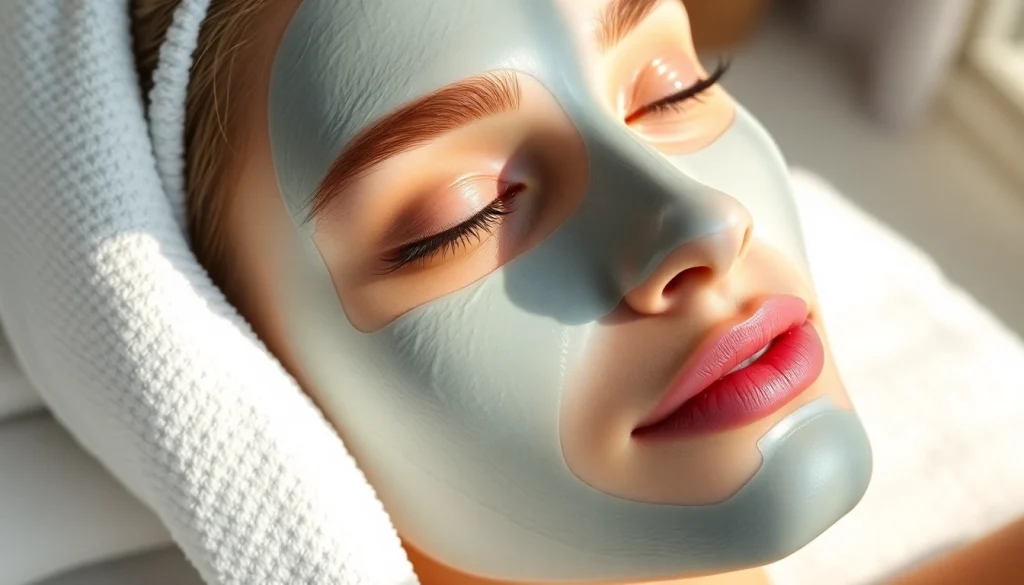
Understanding the Benefits of a Face Mask
Why Facial Masks Are Essential for Your Skincare Routine
In the realm of skincare, facial masks are more than just a luxurious addition to your self-care routine; they’re essential tools that can enhance the health and appearance of your skin. Incorporating a face mask into your routine can offer a myriad of benefits, from deep cleansing to hydration. They act as intensive treatments that target specific concerns, helping to rejuvenate the skin by delivering concentrated ingredients that might not be present in everyday products. Facial masks can hydrate, exfoliate, brighten, or purify your skin, making them suitable for all types regardless of your skincare goals.
Different Types of Face Masks Explained
Facial masks come in various formulations, each serving a unique purpose:
- Cream Masks: Often enriched with oils and moisturizing agents, cream masks seal moisture into the skin and are perfect for dry or mature skin types.
- Clay Masks: Known for their ability to absorb excess oil and impurities, clay masks are ideal for oily or acne-prone skin, providing a deep cleanse.
- Sheet Masks: These pre-cut fabric or cellulose masks are soaked in serums and act like a protective barrier to deliver nutrients directly to the skin.
- Peel-off Masks: Formulated to adhere to the skin and be peeled away, these masks help to remove dead skin cells and give a refreshing glow.
- Gel Masks: Generally lightweight and soothing, gel masks are excellent for sensitive or irritated skin, providing hydration without heaviness.
Common Ingredients in Face Masks and Their Effects
The effectiveness of facial masks largely depends on their ingredients. Here are some common elements found in masks and their benefits:
- Hyaluronic Acid: A powerhouse for hydration, it helps retain moisture in the skin, making it appear plump and youthful.
- Salicylic Acid: Great for oily and acne-prone skin, it helps unclog pores and minimize breakouts.
- Vitamin C: Known for its brightening properties, Vitamin C helps to even out skin tone and reduce the appearance of dark spots.
- Aloe Vera: Renowned for its soothing properties, it calms irritation and hydrates the skin, ideal for sensitive skin types.
- Charcoal: Often used in detoxifying masks, charcoal draws out impurities and excess oil from the skin.
Choosing the Right Face Mask for Your Skin Type
Identifying Your Skin Type and Needs
Before selecting a face mask, it’s crucial to determine your skin type. Generally, skin types can be categorized into five categories:
- Normal: Balanced, not too oily or dry.
- Oily: Shiny complexion with enlarged pores, prone to acne.
- Dry: Flaky, rough texture often accompanied by tightness.
- Combination: A mix of oily and dry areas, commonly oily in the T-zone.
- Sensitive: Prone to irritation, redness, and discomfort with certain products.
An essential step is to assess your skin’s current needs—are you dealing with dryness from winter, blemishes, or a dull complexion? This understanding will guide your choice of the most effective mask.
Best Face Masks for Oily and Acne-Prone Skin
If your skin is oily or prone to acne, consider masks that incorporate clay or charcoal. These ingredients work to absorb excess oil and draw out impurities:
- Clay Masks: Bentonite or kaolin clay masks help control oil production and minimize the appearance of pores.
- Charcoal Masks: These are particularly effective for detoxifying the skin, removing dirt, and clearing out blockages in the pores.
- Salicylic Acid Masks: Formulations containing this ingredient work wonders in preventing future breakouts and accelerating the healing process of current ones.
Hydrating Face Masks for Dry and Sensitive Skin
For those struggling with dry or sensitive skin, hydrating face masks are essential for restoring moisture and soothing irritation:
- Cream Masks: Look for rich formulas containing ingredients like shea butter and coconut oil for deep nourishment.
- Gel Masks: Lightweight and often enriched with botanical extracts, gel masks provide hydration while being gentle on the skin.
- Aloe Vera Masks: Perfect for soothing redness or irritation, aloe vera masks bring calm and hydration.
How to Properly Apply a Face Mask
Step-by-Step Guide to Application
Applying a face mask properly can enhance its effectiveness. Follow these simple steps:
- Prep Your Skin: Cleanse your face thoroughly to remove makeup, dirt, and oil.
- Exfoliate: Optional but beneficial—exfoliating helps remove dead skin cells, allowing for better penetration of the mask.
- Apply the Mask: Use clean fingers or a brush to apply an even layer over your face, avoiding the eye and lip area.
- Relax: Allow the mask to sit for the recommended time (check the packaging for specifics) and take this opportunity to relax.
- Rinse Off: Use lukewarm water to rinse off the mask, gently massaging to remove all residues.
- Follow Up: After removing the mask, follow up with a serum or moisturizer.
Timing and Frequency for Optimal Results
Face masks can be utilized anywhere from once a week to a few times a week, depending on your skin’s needs and the type of mask. Generally, those with stronger chemical formulas (like peels) are best used sparingly. For hydration, using a mask twice a week can keep skin plump and healthy.
Tips for Enhancing Your Mask Experience
To maximize the benefits of your face mask, consider implementing these additional tips:
- Hot Towel Trick: Warm a towel and lay it over your face before applying the mask. The warmth opens pores, allowing for deeper ingredient penetration.
- DIY Additions: Sometimes, adding a drop or two of your favorite essential oil can enhance the experience.
- Mindfulness: Use application time for relaxation—meditation or gentle music can turn a simple skincare routine into a rejuvenating ritual.
Common Mistakes to Avoid When Using Face Masks
Overusing Face Masks: What You Need to Know
While face masks can provide impressive results, overuse can lead to sensitivity or imbalance. Using a mask too frequently can strip the skin of its natural oils, leading to irritation, redness, and breakouts. Stick to a recommended frequency based on your skin type and the mask’s ingredients.
Ignoring Skin Reactions and Allergies
Always perform a patch test before using a new face mask. Apply a small amount to an inconspicuous area and monitor for any adverse reactions for 24 hours. If you experience irritation, redness, or discomfort, discontinue use immediately and consult a dermatologist.
Storing Your Face Masks Properly
Improper storage can alter the effectiveness of your products. Keep masks in a cool, dry place away from direct sunlight. For those containing natural ingredients, refrigerating them can prolong their shelf life and enhance the cooling effect during application.
Review of Popular Face Masks on the Market
Top Picks for Luxury Face Masks
Luxury face masks often come with high-quality ingredients designed to offer extensive benefits. Some top picks include:
- La Mer The Hydrating Facial: Known for its signature Miracle Broth, this treatment deeply nourishes and revitalizes.
- Dr. Brandt Hydro Biotic Recovery Sleeping Mask: Combats dryness while you sleep, promoting recovery with a complex of probiotics.
- Guerlain Orchidée Impériale Mask: A luxurious treatment that targets signs of aging while offering intense hydration.
Budget-Friendly Face Masks That Deliver
Affordability doesn’t equate to low quality. Here are some budget-friendly masks that provide excellent value:
- The Ordinary AHA 30% + BHA 2% Peeling Solution: This exfoliating mask is highly effective yet wallet-friendly.
- Aztec Secret Indian Healing Clay: A cult favorite, this clay mask can be mixed with different agents (like apple cider vinegar) for customizable benefits.
- Yes To Tomatoes Detoxifying Charcoal Peel-Off Mask: Great for those with oily or acne-prone skin seeking a budget-friendly option.
Reader Reviews and Testimonials
Engaging with community feedback can provide insight into the effectiveness of different face masks. Many users rave about specific products, attesting to how they transformed their skincare routines. Engaging in forums or social media can reveal personal stories, success rates, and tips that are often invaluable for anyone looking to enhance their skincare regimen.






